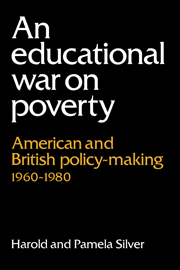Book contents
- Frontmatter
- Contents
- Acknowledgments
- List of abbreviations
- 1 Introduction: a proper complexity
- Part I A pattern of events: United States
- Part II A pattern of events: Britain
- 7 Advancing from poverty?
- 8 Opportunity, equality and social class
- 9 Sounds and silences
- 10 Plowden: direction finding
- 11 Plowden: making choices
- Part III Following through
- Interviews and consultation
- Bibliography
- Index
7 - Advancing from poverty?
Published online by Cambridge University Press: 03 October 2009
- Frontmatter
- Contents
- Acknowledgments
- List of abbreviations
- 1 Introduction: a proper complexity
- Part I A pattern of events: United States
- Part II A pattern of events: Britain
- 7 Advancing from poverty?
- 8 Opportunity, equality and social class
- 9 Sounds and silences
- 10 Plowden: direction finding
- 11 Plowden: making choices
- Part III Following through
- Interviews and consultation
- Bibliography
- Index
Summary
The American developments we have traced in the 1960s did not have straightforward echoes in Britain, and were listened to and interpreted in ways it is important to explore. Also related to that process are the ways in which British and European messages were received in the reverse direction, and in general the kind of professional and political networks, and the publicity machine, which conveyed or failed to convey these messages. The analysis here is about silences as well as echoes and dialogue, and we shall return to some crucial aspects of these processes.
A connection between poverty and educational policy was not established in Britain in any sustained public and explicit form until the late 1960s and, specifically, following the publication of the Plowden report on Children and their Primary Schools in 1967, though there were important, parallel and in some ways connected issues and processes in previous decades. The sequence of public events which in any way matches or relates to that in the United States begins, however, in 1967 following crucial investigations and discussions – some significant ones of which were not publicized – in the Plowden committee. It continues through the designation of Educational Priority Areas and EPA projects from 1968, the use of Urban Aid funds and various urban and social policy initiatives of the late 1960s and early 1970s. There were, during this period, responses to the American experience from the early 1960s, but the British literature linking education, poverty and disadvantage becomes significant only at the beginning of the 1970s.
- Type
- Chapter
- Information
- An Educational War on PovertyAmerican and British Policy-making 1960–1980, pp. 147 - 157Publisher: Cambridge University PressPrint publication year: 1991



